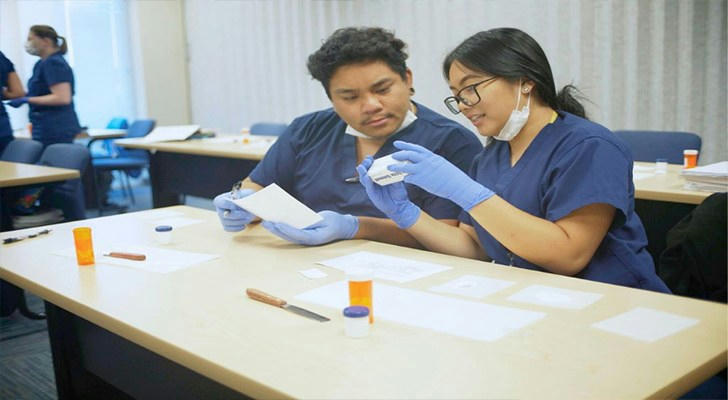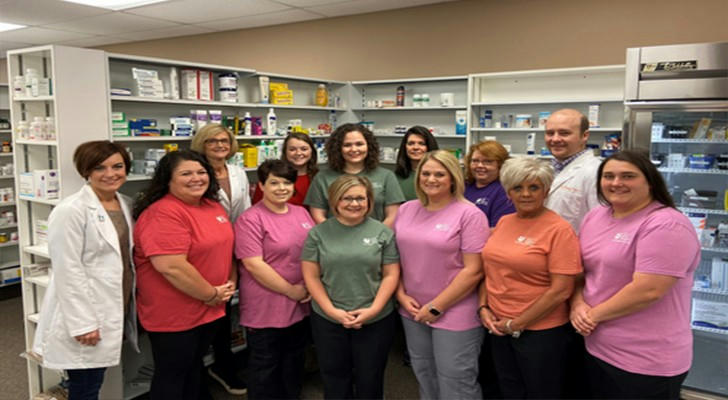Pharmacy Assistant Training: Your Gateway to Healthcare!
If you’re looking for an exciting and rewarding career in the healthcare field, becoming a pharmacy assistant could be your perfect entry point. Pharmacy assistants play a vital role in supporting pharmacists, ensuring that customers receive the correct medications, and helping with the smooth operation of pharmacies. Whether in a community pharmacy, hospital, or a retail chain, pharmacy assistants are essential in helping patients understand their medications, processing prescriptions, and handling the behind-the-scenes work that keeps pharmacies running smoothly.

Why Pharmacy Assistant Training is a Great Choice
Pharmacy assistant training is ideal for anyone seeking a quick, affordable way to enter the healthcare field. Most training programs can be completed in a matter of months, and they offer a comprehensive education that combines classroom learning with hands-on experience. The demand for pharmacy assistants continues to grow as the healthcare industry expands, making this a career with excellent job security and opportunities for advancement.
Key reasons to consider this training include:
• Short Training Time: You can often complete a pharmacy assistant program in 6 to 12 months, allowing you to start working quickly.
• In-Demand Career: With more people relying on prescription medications, the need for qualified pharmacy assistants is on the rise.
• Flexible Job Options: Work in various environments, including retail pharmacies, hospitals, and long-term care facilities.
• Career Advancement: A pharmacy assistant role can be a stepping stone to other healthcare positions, including becoming a pharmacy technician or even a pharmacist with further education.
What Will You Learn in a Pharmacy Assistant Program?
A pharmacy assistant training program is designed to give you a solid foundation in pharmacy operations, medication knowledge, and customer service. Here’s a closer look at some of the key areas of focus:

1.Pharmacy Operations
As a pharmacy assistant, you will be responsible for helping pharmacists with day-to-day tasks. This includes processing prescriptions, managing inventory, preparing medication labels, and handling customer transactions. During your training, you will learn how a pharmacy functions, including the tools and systems used to manage patient information, stock medications, and ensure compliance with safety and regulatory guidelines.
2.Medication Knowledge
You don’t need to be a pharmacist to understand the basics of medications. A pharmacy assistant program will teach you about different types of drugs, their uses, and how they should be administered. You will also learn about dosage calculations, how to identify generic versus brand-name drugs, and the potential side effects of various medications. This knowledge is essential for ensuring patients receive the correct prescriptions and can use them safely.
3.Customer Service and Communication
Pharmacy assistants are often the first point of contact for customers, so strong communication skills are a must. During your training, you will learn how to interact with customers in a professional and helpful manner. This includes answering questions about medications, providing guidance on over-the-counter products, and handling concerns about side effects or drug interactions. You’ll also learn how to communicate effectively with pharmacists, doctors, and other healthcare professionals.
4.Inventory and Supply Management
One of the key responsibilities of a pharmacy assistant is managing the inventory of medications. This involves ordering new stock, tracking expiration dates, and ensuring that all products are stored properly. You will learn how to use pharmacy management systems to keep accurate records, avoid stock shortages, and maintain a clean, organized work environment.
5.Legal and Ethical Guidelines
Pharmacy assistants must follow strict regulations to ensure the safe handling and dispensing of medications. You will be trained in the legal and ethical responsibilities of working in a pharmacy, including patient confidentiality, handling controlled substances, and complying with federal and state regulations. Understanding these guidelines is essential for ensuring patient safety and maintaining the integrity of the pharmacy.
Career Outlook for Pharmacy Assistants
The demand for pharmacy assistants is growing steadily as the population ages and more people require medication to manage chronic health conditions. According to the U.S. Bureau of Labor Statistics, employment of pharmacy assistants is expected to grow by around 4% over the next decade, creating thousands of new jobs in the field.

Pharmacy assistants are needed in a variety of settings, including:
• Retail Pharmacies: Working in drugstores and supermarkets, pharmacy assistants help fill prescriptions, manage the counter, and answer customer questions.
• Hospitals: In a hospital setting, pharmacy assistants support pharmacists in preparing medications for patients and managing the pharmacy’s inventory.
• Long-Term Care Facilities: Pharmacy assistants in nursing homes and assisted living facilities help ensure residents receive the medications they need, often coordinating with nurses and caregivers.
Benefits of Becoming a Pharmacy Assistant
1.Job Security: Healthcare is a stable and growing industry, offering long-term career opportunities.
2.Hands-On Work: You’ll be directly involved in patient care, helping people manage their health through medications.
3.Opportunity for Growth: With experience, pharmacy assistants can move into higher-paying roles, such as pharmacy technicians or even pursue further education to become licensed pharmacists.
4.Flexible Schedules: Many pharmacies are open evenings, weekends, and holidays, providing flexible working hours to suit different lifestyles.
5.Making a Difference: As a pharmacy assistant, you’ll be playing an important role in helping people stay healthy and live better lives.
How to Get Started
If you’re ready to take the first step towards a rewarding career, enrolling in a pharmacy assistant training program is easy. Most community colleges, vocational schools, and online institutions offer pharmacy assistant courses, many of which can be completed in less than a year. The programs typically include both classroom instruction and practical experience through internships or clinical placements, giving you the skills and confidence to succeed in the field.
Case Study: Emily Johnson's Journey to Becoming a Pharmacy Assistant
• Background: Emily, a 24-year-old with a passion for helping others, was looking for a career change after working in retail for several years. She was drawn to the healthcare field but was unsure how to enter it without extensive education. After researching various options, she enrolled in a pharmacy assistant training program at her local community college.
• Training Experience: Emily completed her pharmacy assistant program in just nine months. The curriculum included hands-on training in pharmacy operations, medication knowledge, customer service, and legal guidelines. She particularly enjoyed the practical components, which involved working in a simulated pharmacy environment where she learned to process prescriptions and manage inventory.
• Job Placement: Upon completing her training, Emily secured a position at Greenwood Pharmacy, a community pharmacy known for its commitment to patient care. During her interview, she highlighted her training and demonstrated her understanding of medication management and customer service skills.
• Role and Responsibilities:
As a pharmacy assistant, Emily's daily tasks include:
• Assisting pharmacists in filling prescriptions and managing inventory.
• Providing information to customers about over-the-counter medications and answering their questions.
• Ensuring compliance with safety regulations and maintaining patient confidentiality.
• Impact on Patients: One of Emily's memorable experiences involved helping an elderly customer who was confused about her medications. By patiently explaining the proper usage and potential side effects, Emily not only alleviated the customer's concerns but also reinforced the importance of medication adherence. This interaction underscored the vital role pharmacy assistants play in enhancing patient understanding and safety.
• Career Advancement: After working at Greenwood Pharmacy for over a year, Emily expressed interest in advancing her career. The pharmacy offered support for further education, allowing her to pursue certification as a pharmacy technician. She plans to enroll in an accredited program soon, aiming to become a licensed pharmacist eventually.
Emily Johnson's journey exemplifies how pharmacy assistant training can serve as an effective gateway into the healthcare field. With short training times, hands-on experience, and strong job prospects, aspiring individuals can find rewarding careers that allow them to make meaningful contributions to their communities. If you're considering a career as a pharmacy assistant, Emily's story is a testament to the opportunities that await you!
Conclusion
Pharmacy assistant training is your gateway to a fulfilling career in healthcare. Whether you’re just starting out or looking for a career change, this program offers a fast, affordable path to a job with excellent growth potential. With the right training, you can join the ranks of healthcare professionals who are making a real difference in people’s lives. Start your journey today and discover the opportunities waiting for you as a pharmacy assistant!
